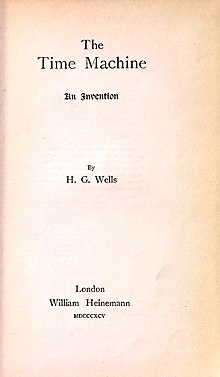
Social science fiction
Social science fiction is a subgenre of science fiction, usually (but not necessarily) soft science fiction, concerned less with technology/space opera and more with speculation about society. In other words, it "absorbs and discusses anthropology" and speculates about human behavior and interactions.Exploration of fictional societies is a significant aspect of science fiction, allowing it to perform predictive (The Time Machine, 1895; The Final Circle of Paradise, 1965) and precautionary (Brave New World, 1932; Nineteen Eighty-Four, 1949; Childhood's End, Fahrenheit 451, 1953) functions, to criticize the contemporary world (Gulliver's Travels, 1726; the works of Alexander Gromov, 1995–present) and to present solutions (Walden Two, Freedom™), to portray alternative societies (World of the Noon) and to examine the implications of ethical principles, as for example in the works of Sergei Lukyanenko.
2 episodes
Episodes in this category also belong to the following categories:
Nineteen Eighty-Four
Melvyn Bragg and guests discuss Orwell's dystopian novel where the state rewrites history, war is peace, freedom is slavery, ignorance is strength - and Big Brother is watching you
15 September 2022
Featuring: David Dwan, Lisa Mullen, John Bowen
CultureBritish novels adapted into filmsNovels set in LondonBritish novels adapted into television showsEnglish novelsBritish science fiction novelsCensored booksNovels adapted into operasNovels set in fictional countriesNovels adapted into balletsDystopian novelsSocial science fictionNovels adapted into radio programsBritish political novels, Novels about propaganda, Novels about revolutionaries, Novels about totalitarianism, Novels by George Orwell, Secker & Warburg booksBritish novels adapted into playsThe Time Machine
Melvyn Bragg and guests discuss the ideas and anxieties in late Victorian London, explored by HG Wells in his story of time travel, evolution and a planet unfit for humans.
17 October 2019
Featuring: Simon Schaffer, Amanda Rees, Simon James

